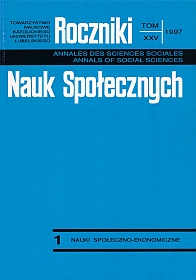Działalność naukowo-dydaktyczna prof. dra hab. Adama Rodzińskiego
Abstract
Adam Rodziński was born on 28 November 1920; earned PhD in 1956 and wrote habilitation in 1966 on ethics; dean of the Faculty of Christian Philosophy (1979/80); author of four books (Sprawiedliwość chrześcijańska wobec problemów nierówności majątkowych w II i III wieku, 1960 [Christian Justice Towards the Problems of Property Inequality in the Second and Third Centuries]; U podstaw kultury moralnej, 1968 [At the Foundations of Moral Culture]; Osoba i kultura, 1985 [Person and Culture]; Osoba, moralność, kultura, 1989 [Person, Morality, Culture] and a few dozen other learned works (studies, papers, essays, reports and reviews).
The subject matter of his scientific research converges on the borderline between the following disciplines: philosophical anthropology, axiology, ethics and philosophy of culture. He accepts the essential elements of Thomism, but at the same time utilizes the fruits of modern philosophy, mainly axiology, phenomenology and social Personalism. His conception of man distinguishes two orders: ontological and axiological. Man, in his ontological aspect, is a substantial being; in the axiological order man is a subject of social relations and the highest value of the visible world. Man is a being directed to other people, it is „someone towards somebody”.
The second subject matter of Professor’s interests is the theory of values. Value differs from the ontological good, for it always refers to the world of people. Value is a relational being, but not subjective or relative. Values are differentiated as to their quality, their opposition being anti-values which are an expression of disharmony between the deeds of man and his indispenrable. Ethics, according to Professor, differs from utilitarianism, felicitology and individualistic perfectionism. The ethics of universal dignity of man is a normative ethics, referring to intellectual intuition and the voice of conscience. Person is a superior value, therefore the criterium of valuing makes the constant dignity of man. Natural law is an integral element of ethics, a law which is expression of that dignity. Ethics includes also personalistic aretology, wherein priority must be given to the virtue of wisdom. An important element of ethics, too, is justice, especially social justice, linked with charity.
The philosophy of culture is yet another subject matter of Professor’s scientific research. He proposes various descriptions of culture: ontological, axiological and sociological, stressing above all the relationship between culture, personalism and axiology.
Professor Adam Rodziński conducted scientific and didactic classes for over 40 years (1952-1996) and from 1968 on headed the Chair of Ethics, later to be named the Chair of the Philosophy of Culture.
Copyright (c) 1997 Roczniki Nauk Społecznych

This work is licensed under a Creative Commons Attribution-NonCommercial-NoDerivatives 4.0 International License.


